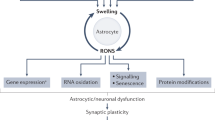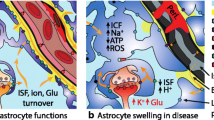Abstract
Hepatic encephalopathy (HE), a complex neuropsychiatric syndrome, is a frequent complication of liver failure/disease. Increased concentrations of lactate are commonly observed in HE patients, in the systemic circulation, but also in the brain. Traditionally, increased cerebral lactate is considered a marker of energy failure/impairment however alterations in lactate homeostasis may also lead to a rise in brain lactate and result in neuronal dysfunction. The latter may involve the development of brain edema. This review will target the significance of increased cerebral lactate in the pathogenesis of HE.



Similar content being viewed by others
Notes
Throughout the text, “lactate” will represent L-lactate.
Throughout the text, “LDH” will represent L-LDH.
Abbreviations
- HE:
-
hepatic encephalopathy
- MG:
-
methylglyoxal
- LDH:
-
lactate dehydrogenase
- TCA:
-
tricarboxylic acid cycle
- ANLS:
-
astrocyte-neuron lactate shuttle
- BBB:
-
blood–brain barrier
- MCT:
-
monocarboxylate transporter
- ALF:
-
acute liver failure
- CLD:
-
chronic liver disease
- DCA:
-
dichloroacetate
References
Abdelmalak M, Lew A, Ramezani R et al (2013) Long-term safety of dichloroacetate in congenital lactic acidosis. Mol Genet Metab 109:139–143. doi:10.1016/j.ymgme.2013.03.019
Amodio P, Biancardi A, Montagnese S et al (2007) Neurological complications after orthotopic liver transplantation. Dig Liver Dis Off J Ital Soc Gastroenterol Ital Assoc Study Liver 39:740–747. doi:10.1016/j.dld.2007.05.004
Atluri DK, Asgeri M, Mullen KD (2010) Reversibility of hepatic encephalopathy after liver transplantation. Metab Brain Dis 25:111–113. doi:10.1007/s11011-010-9178-x
Bajaj JS, Saeian K, Verber MD et al (2007) Inhibitory control test is a simple method to diagnose minimal hepatic encephalopathy and predict development of overt hepatic encephalopathy. Am J Gastroenterol 102:754–760. doi:10.1111/j.1572-0241.2007.01048.x
Baron J-C, Yamauchi H, Fujioka M, Endres M (2014) Selective neuronal loss in ischemic stroke and cerebrovascular disease. J Cereb Blood Flow Metab Off J Int Soc Cereb Blood Flow Metab 34:2–18. doi:10.1038/jcbfm.2013.188
Bélanger M, Yang J, Petit J-M et al (2011) Role of the glyoxalase system in astrocyte-mediated neuroprotection. J Neurosci Off J Soc Neurosci 31:18338–18352. doi:10.1523/JNEUROSCI.1249-11.2011
Bernal W, Donaldson N, Wyncoll D, Wendon J (2002) Blood lactate as an early predictor of outcome in paracetamol-induced acute liver failure: a cohort study. Lancet 359:558–563. doi:10.1016/S0140-6736(02)07743-7
Bittar PG, Charnay Y, Pellerin L et al (1996) Selective distribution of lactate dehydrogenase isoenzymes in neurons and astrocytes of human brain. J Cereb Blood Flow Metab Off J Int Soc Cereb Blood Flow Metab 16:1079–1089. doi:10.1097/00004647-199611000-00001
Bjerring PN, Hauerberg J, Frederiksen H-J et al (2008) Cerebral glutamine concentration and lactate-pyruvate ratio in patients with acute liver failure. Neurocrit Care 9:3–7. doi:10.1007/s12028-008-9060-4
Bjerring PN, Hauerberg J, Jørgensen L et al (2010) Brain hypoxanthine concentration correlates to lactate/pyruvate ratio but not intracranial pressure in patients with acute liver failure. J Hepatol 53:1054–1058. doi:10.1016/j.jhep.2010.05.032
Bo J, Li W, Chen Z et al (2013) D-lactate: a novel contributor to metabolic acidosis and high anion gap in diabetic ketoacidosis. Clin Chem 59:1406–1407. doi:10.1373/clinchem.2013.208777
Bosman DK, Deutz NE, De Graaf AA et al (1990) Changes in brain metabolism during hyperammonemia and acute liver failure: results of a comparative 1H-NMR spectroscopy and biochemical investigation. Hepatol Baltim Md 12:281–290
Bosoi CR, Rose CF (2013) Brain edema in acute liver failure and chronic liver disease: similarities and differences. Neurochem Int 62:446–457. doi:10.1016/j.neuint.2013.01.015
Bosoi CR, Yang X, Huynh J et al (2012) Systemic oxidative stress is implicated in the pathogenesis of brain edema in rats with chronic liver failure. Free Radic Biol Med 52:1228–1235. doi:10.1016/j.freeradbiomed.2012.01.006
Bosoi CR, Zwingmann C, Marin H et al (2014) Increased brain lactate is central to the development of brain edema in rats with chronic liver disease. J Hepatol 60:554–560. doi:10.1016/j.jhep.2013.10.011
Butterworth RF (2007) Neuronal cell death in hepatic encephalopathy. Metab Brain Dis 22:309–320. doi:10.1007/s11011-007-9072-3
Butterworth RF, Kril JJ, Harper CG (1993) Thiamine-dependent enzyme changes in the brains of alcoholics: relationship to the Wernicke-Korsakoff syndrome. Alcohol Clin Exp Res 17:1084–1088
Calvert LD, Shelley R, Singh SJ et al (2008) Dichloroacetate enhances performance and reduces blood lactate during maximal cycle exercise in chronic obstructive pulmonary disease. Am J Respir Crit Care Med 177:1090–1094. doi:10.1164/rccm.200707-1032OC
Cauli O, López-Larrubia P, Rodrigo R et al (2011) Brain region-selective mechanisms contribute to the progression of cerebral alterations in acute liver failure in rats. Gastroenterology 140:638–645. doi:10.1053/j.gastro.2010.10.043
Chatauret N, Zwingmann C, Rose C et al (2003) Effects of hypothermia on brain glucose metabolism in acute liver failure: a H/C-nuclear magnetic resonance study. Gastroenterology 125:815–824
Chavarria L, Oria M, Romero-Gimenez J et al (2010) Diffusion tensor imaging supports the cytotoxic origin of brain edema in a rat model of acute liver failure. Gastroenterology 138:1566–1573. doi:10.1053/j.gastro.2009.10.003
Chen F, Ohashi N, Li W et al (2009) Disruptions of occludin and claudin-5 in brain endothelial cells in vitro and in brains of mice with acute liver failure. Hepatol Baltim Md 50:1914–1923. doi:10.1002/hep.23203
Ciancio A, Marchet A, Saracco G et al (2002) Spectral electroencephalogram analysis in hepatic encephalopathy and liver transplantation. Liver Transplant Off Publ Am Assoc Study Liver Dis Int Liver Transplant Soc 8:630–635. doi:10.1053/jlts.2002.33971
Clemmesen JO, Høy CE, Kondrup J, Ott P (2000) Splanchnic metabolism of fuel substrates in acute liver failure. J Hepatol 33:941–948
Fitzpatrick SM, Hetherington HP, Behar KL, Shulman RG (1989) Effects of acute hyperammonemia on cerebral amino acid metabolism and pHi in vivo, measured by 1H and 31P nuclear magnetic resonance. J Neurochem 52:741–749
Gorman AM (2008) Neuronal cell death in neurodegenerative diseases: recurring themes around protein handling. J Cell Mol Med 12:2263–2280. doi:10.1111/j.1582-4934.2008.00402.x
Hartmann IJ, Groeneweg M, Quero JC et al (2000) The prognostic significance of subclinical hepatic encephalopathy. Am J Gastroenterol 95:2029–2034. doi:10.1111/j.1572-0241.2000.02265.x
Hertz L, Dienel GA (2002) Energy metabolism in the brain. Int Rev Neurobiol 51:1–102
Hindfelt B, Plum F, Duffy TE (1977) Effect of acute ammonia intoxication on cerebral metabolism in rats with portacaval shunts. J Clin Invest 59:386–396. doi:10.1172/JCI108651
Jeppesen JB, Mortensen C, Bendtsen F, Møller S (2013) Lactate metabolism in chronic liver disease. Scand J Clin Lab Invest. doi:10.3109/00365513.2013.773591
Kaila K, Ransom BR (1998) pH and brain function. Wiley-Liss, New York
Kim WR, Brown RS Jr, Terrault NA, El-Serag H (2002) Burden of liver disease in the United States: summary of a workshop. Hepatol Baltim Md 36:227–242. doi:10.1053/jhep.2002.34734
Krautwald M, Münch G (2010) Advanced glycation end products as biomarkers and gerontotoxins - a basis to explore methylglyoxal-lowering agents for Alzheimer’s disease? Exp Gerontol 45:744–751. doi:10.1016/j.exger.2010.03.001
Kumar A, Kant S, Singh SM (2013) Antitumor and chemosensitizing action of dichloroacetate implicates modulation of tumor microenvironment: a role of reorganized glucose metabolism, cell survival regulation and macrophage differentiation. Toxicol Appl Pharmacol 273:196–208. doi:10.1016/j.taap.2013.09.005
Lai JC, Cooper AJ (1986) Brain alpha-ketoglutarate dehydrogenase complex: kinetic properties, regional distribution, and effects of inhibitors. J Neurochem 47:1376–1386
Languren G, Montiel T, Julio-Amilpas A, Massieu L (2013) Neuronal damage and cognitive impairment associated with hypoglycemia: an integrated view. Neurochem Int 63:331–343. doi:10.1016/j.neuint.2013.06.018
Lee WM (1993) Acute liver failure. N Engl J Med 329:1862–1872. doi:10.1056/NEJM199312163292508
Levraut J, Ciebiera JP, Chave S et al (1998) Mild hyperlactatemia in stable septic patients is due to impaired lactate clearance rather than overproduction. Am J Respir Crit Care Med 157:1021–1026. doi:10.1164/ajrccm.157.4.9705037
Lin S, Raabe W (1985) Ammonia intoxication: effects on cerebral cortex and spinal cord. J Neurochem 44:1252–1258
Lowry OH, Passonneau JV (1966) Kinetic evidence for multiple binding sites on phosphofructokinase. J Biol Chem 241:2268–2279
Mans AM, DeJoseph MR, Hawkins RA (1994) Metabolic abnormalities and grade of encephalopathy in acute hepatic failure. J Neurochem 63:1829–1838
Pellerin L, Magistretti PJ (2012) Sweet sixteen for ANLS. J Cereb Blood Flow Metab Off J Int Soc Cereb Blood Flow Metab 32:1152–1166. doi:10.1038/jcbfm.2011.149
Pellerin L, Bouzier-Sore A-K, Aubert A et al (2007) Activity-dependent regulation of energy metabolism by astrocytes: an update. Glia 55:1251–1262. doi:10.1002/glia.20528
Perazzo JC (2012) Hepatic encephalopathy: an approach to its multiple pathophysiological features. World J Hepatol 4:50. doi:10.4254/wjh.v4.i3.50
Pierre K, Pellerin L (2005) Monocarboxylate transporters in the central nervous system: distribution, regulation and function. J Neurochem 94:1–14. doi:10.1111/j.1471-4159.2005.03168.x
Preuss M (2012) An energy-failure based brain edema concept. Med Hypotheses 79:259–260. doi:10.1016/j.mehy.2012.05.003
Rose C (2012) Ammonia-lowering strategies for the treatment of hepatic encephalopathy. Clin Pharmacol Ther 92(3):321–31. doi:10.1038/clpt.2012.112
Rose C, Kresse W, Kettenmann H (2005) Acute insult of ammonia leads to calcium-dependent glutamate release from cultured astrocytes, an effect of pH. J Biol Chem 3(280(22)):20937–44
Rose C, Ytrebø LM, Davies NA et al (2007) Association of reduced extracellular brain ammonia, lactate, and intracranial pressure in pigs with acute liver failure. Hepatol Baltim Md 46:1883–1892. doi:10.1002/hep.21877
Sawara K, Desjardins P, Chatauret N et al (2009) Alterations in expression of genes coding for proteins of the neurovascular unit in ischemic liver failure. Neurochem Int 55:119–123. doi:10.1016/j.neuint.2009.01.023
Schurr A (2006) Lactate: the ultimate cerebral oxidative energy substrate? J Cereb Blood Flow Metab Off J Int Soc Cereb Blood Flow Metab 26:142–152. doi:10.1038/sj.jcbfm.9600174
Sen S, Rose C, Ytrebø LM et al (2006) Effect of albumin dialysis on intracranial pressure increase in pigs with acute liver failure: a randomized study. Crit Care Med 34:158–164
Shih MT, Singh AK, Wang A-M, Patel S (2004) Brain lesions with elevated lactic acid peaks on magnetic resonance spectroscopy. Curr Probl Diagn Radiol 33:85–95. doi:10.1016/j.cpradiol.2003.11.002
Sotil EU, Gottstein J, Ayala E et al (2009) Impact of preoperative overt hepatic encephalopathy on neurocognitive function after liver transplantation. Liver Transplant Off Publ Am Assoc Study Liver Dis Int Liver Transplant Soc 15:184–192. doi:10.1002/lt.21593
Stacpoole PW, Henderson GN, Yan Z, James MO (1998) Clinical pharmacology and toxicology of dichloroacetate. Environ Health Perspect 106(4):989–994
Stadtman ER, Levine RL (2000) Protein oxidation. Ann N Y Acad Sci 899:191–208
Staub F, Baethmann A, Peters J et al (1990) Effects of lactacidosis on glial cell volume and viability. J Cereb Blood Flow Metab Off J Int Soc Cereb Blood Flow Metab 10:866–876
Tas A, Akbal E, Beyazit Y, Kocak E (2012) Serum lactate level predict mortality in elderly patients with cirrhosis. Wien Klin Wochenschr 124:520–525. doi:10.1007/s00508-012-0208-z
Therrien G, Rose C, Butterworth J, Butterworth RF (1997) Protective effect of L-carnitine in ammonia-precipitated encephalopathy in the portacaval shunted rat. Hepatol Baltim Md 25:551–556. doi:10.1002/hep.510250310
Tofteng F, Jorgensen L, Hansen BA et al (2002) Cerebral microdialysis in patients with fulminant hepatic failure. Hepatol Baltim Md 36:1333–1340. doi:10.1053/jhep.2002.36944
Vogels BA, Karlsen OT, Mass MA et al (1997) L-ornithine vs. L-ornithine-L-aspartate as a treatment for hyperammonemia-induced encephalopathy in rats. J Hepatol 26:174–182
Woll PJ, Record CO (1979) Lactate elimination in man: effects of lactate concentration and hepatic dysfunction. Eur J Clin Invest 9:397–404
Wright G, Davies NA, Shawcross DL et al (2007) Endotoxemia produces coma and brain swelling in bile duct ligated rats. Hepatol Baltim Md 45:1517–1526. doi:10.1002/hep.21599
Yamamoto S, Nguyen JH (2006) TIMP-1/MMP-9 imbalance in brain edema in rats with fulminant hepatic failure. J Surg Res 134:307–314. doi:10.1016/j.jss.2005.11.588
Yao H, Sadoshima S, Fujii K et al (1987) Cerebrospinal fluid lactate in patients with hepatic encephalopathy. Eur Neurol 27:182–187
Zauner C, Schneeweiss B, Schneider B et al (2000) Short-term prognosis in critically ill patients with liver cirrhosis: an evaluation of a new scoring system. Eur J Gastroenterol Hepatol 12:517–522
Zosel A, Egelhoff E, Heard K (2010) Severe lactic acidosis after an iatrogenic propylene glycol overdose. Pharmacotherapy 30:219. doi:10.1592/phco.30.2.219
Zwingmann C (2007) Nuclear magnetic resonance studies of energy metabolism and glutamine shunt in hepatic encephalopathy and hyperammonemia. J Neurosci Res 85:3429–3442. doi:10.1002/jnr.21445
Zwingmann C, Chatauret N, Leibfritz D, Butterworth RF (2003) Selective increase of brain lactate synthesis in experimental acute liver failure: results of a [H-C] nuclear magnetic resonance study. Hepatol Baltim Md 37:420–428. doi:10.1053/jhep.2003.50052
Author information
Authors and Affiliations
Corresponding author
Rights and permissions
About this article
Cite this article
Bosoi, C.R., Rose, C.F. Elevated cerebral lactate: Implications in the pathogenesis of hepatic encephalopathy. Metab Brain Dis 29, 919–925 (2014). https://doi.org/10.1007/s11011-014-9573-9
Received:
Accepted:
Published:
Issue Date:
DOI: https://doi.org/10.1007/s11011-014-9573-9




